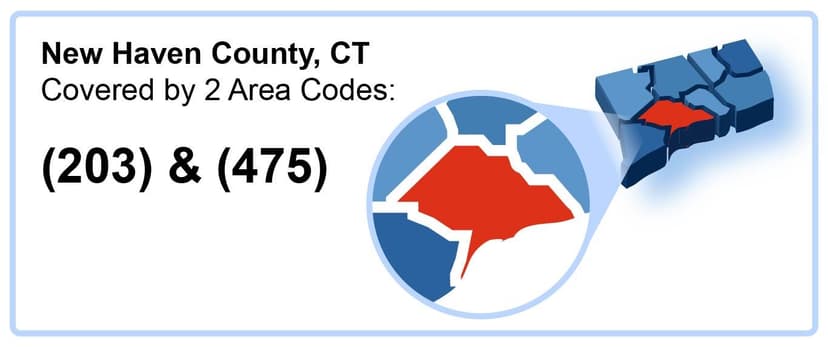What are New Haven County Area Codes?

Area codes are the three-digit sequences that begin all phone numbers in the United States. An area code defines a Numbering Plan Area (NPA), identifying where a phone call originated. Area codes were created by the North American Numbering Plan (NANP) to define telephone service areas. The Connecticut Public Utilities Regulatory Authority is in charge of administering area codes in Connecticut.
There are currently two area codes for New Haven County: area codes 203 and 475. They cover the entire county and include locations in some of the nearby counties. Both area codes serve the following cities in New Haven County: Ansonia, Cheshire, Derby, Woodbridge, Madison, Meriden, Milford, New Haven, East Haven, and West Haven.
Area code 203 was the original code for the entire State of Connecticut when it was issued in 1947. It was reassigned to a smaller area in August 1999. The NPA now covers Connecticut’s western border along its southern coast, ending at the towns of Madison to the south and Meriden to the north.
Area code 475 is the NANP overlay area code for the 203 numbering plan area. Overlay codes are added when a location requires more telephone numbers that the current code can provide. It was implemented in December 2009.
What Are the Best Cell Phone Plans in New Haven County?
Over the last few decades, wireless cell phone subscription has overtaken landlines in Connecticut. According to a 2018 survey conducted by the CDC, Connecticut adults (over 18) using wireless-only telephone services were estimated to be 40.8% of the adult population. Those who still used landlines only were estimated to be 6.6% of the adult population. Among residents under 18, wireless-only telephone users made up 50.6% while landline-only users came to 2.3%.
New Haven County enjoys excellent coverage from the four top carriers. AT&T has the most robust coverage at 99%, followed by T-Mobile at 98.4%, and Verizon at 98.3%. Sprint's coverage is the least but still strong at 95.2%.
Voice Over Internet Protocol (VoIP) service is a form of telephony service acquiring a growing user base in Connecticut. VoIP provides telephone services over IP networks, such as the internet, making long-distance calls cheaper than cell phones and landlines. There are a variety of VoIP service providers available in the county and catering to home and business users.
What Are New Haven County Phone Scams?
These are scams run using telephone services and aimed at defrauding and/or stealing confidential information from county residents. Reverse phone lookup services are useful tools for identifying phone scammers. The New Haven Police Department (NHPD) and consumer protection agencies, like the Federal Trade Commission (FTC), provide information about the county’s scams. The Connecticut State Department of Consumer Protection (DCP) also provides scam alerts. Residents that have been targeted by scammers should file reports with the FTC or file complaints with the DCP. Some of the common phone scams recorded in the county are explained below:
What are Romance Scams?
Residents looking for love are targets for scammers. In these scams, they usually meet on dating websites using fake identities and use phone calls to deepen the relationships and gain the targets’ trust. The scammers will then ask victims for money, claiming to need aid for personal or business problems or even for travel to see the victims. Residents are advised to be careful when using dating apps and websites. Performing a phone number lookup on the phone number used to call can help determine if the caller is who they claim to be.
What are Employment Scams?
This scam begins when the target is called by a scammer and informed of a lucrative job offer. From there, the scam may take any of a number of paths. In one form, the target is directed to a fake company website to fill out a form. This is an attempt to collect personal information to steal the target’s identity. In another, the scammers asked the targets to send money to pay for some advanced training for available jobs.
Residents can avoid these scams by doing some research on job offers. Performing phone number searches may also help identify the callers. Residents should be wary of callers who push them to make quick decisions without time for due diligence on the employment offers. Avoid job listings that ask for personal information or money for credit checks and training.
What are IRS Scams?
In this scam, a resident is called up by a scammer pretending to be an official of the Internal Revenue Service. The scammer informs the resident that they owe taxes and are about to be arrested or have their assets seized by the government. IRS scammers ask the residents to pay money to solve their tax issues or provide personal information to correct them. They will ask for the payment by wire transfers, gift cards, and such hard-to-trace methods. The IRS will neither threaten you with arrest nor ask for financial information over the phone. They will also never insist on payments through unofficial channels.
What are Senior Citizen Scams?
These are scams that mainly target senior citizens and older residents. A senior citizen receives a call from a scammer claiming to be from a local hospital or a health organization. They try to get the target to pay for bogus treatments and medication. A recent variation of this scam in New Haven County offers a vaccine for Covid-19. However, no approved vaccine currently exists for the virus. Do not purchase medications or pay for treatments over the phone. They could be dangerous to your health, in addition to being a scam. Always get medicine from registered doctors and pharmacies.
What are Robocalls and Spam Calls?
Robocalls are automated phone calls that auto-dial numbers and deliver recorded messages. Robocalls were created as a way for marketers and businesses to reach a lot of customers with minimal effort. Over the years, however, they have increasingly become a tool for scams. Using pre-recorded messages, the scammers try to make residents reveal sensitive personal or financial information. Reverse phone lookups can identify the numbers behind robocalls and spam calls.
Listed below are some steps to take to stop robocalls:
- Cut off a call once established that it is a robocall. Do not follow any directions given during the call. Following such prompts proves that your number belongs to a real person and ready to get more robocalls.
- Ask your phone service provider about apps/services for blocking robocalls and how much it costs. Most service providers provide some type of blocking service for free.
- Check online for free phone number lookup applications and services. These will alert you if a number is a spam call or robocall.
- Register your number with the National Do Not Call Registry. Legitimate marketers and businesses subscribe to this list and know to avoid numbers on it.
- File a complaint about robocalls with local consumer protection agencies or the Federal trade commission (FTC) and the Federal communications commission (FCC).
How to Spot and Report New Haven County Phone Scams?
Scammers are continuously devising new ways to trick people and steal money and sensitive information. To avoid getting scammed, consumers must educate themselves on the tactics used and look out for the signals that identify scams. Running suspicious numbers through reverse phone lookup services can help identify scam callers by name or address. Some telltale signs that a phone call is from a scammer include the following:
- Phone calls from government agencies you did not initiate. Government agencies do not make unsolicited phone calls to ask for payments and sensitive information from residents. Payments are made through official channels either in person or through the agencies’ websites.
- Bogus offers of gifts and shopping sprees that require the targets’ personal information or upfront cash payments to redeem. You should not have to pay for anything advertised as free.
- Threatening phone calls from law enforcement demanding payment to clear arrest warrants or crimes. Law enforcement agencies will never threaten you for payment over the phone.
- Calls from health organizations offering miracle drugs and free checkups, then asking for payment or personal information. These are scams, only buy medicines and perform checks at registered pharmacies and hospitals.
- Automated calls from any organization not permitted to contact you are illegal robocalls and could very well be scams.
The best way to avoid phone scams is to be informed about scammers’ operations and be aware of the possibility. Many online services provide free phone number lookups by name and address to help phone users identify unknown callers who can be scammers.
Government agencies in the county are dedicated to fighting scams and provide both warnings and aid to help residents and victims. Some of these organizations are:
Local Law Enforcement
The New Haven Police Department is the primary law enforcement agency in the county. They provide information and alerts about the common scams in the county. Residents targeted by scammers, especially callers claiming to be law enforcement, should contact their districts' police divisions.
Connecticut State Department of Consumer Protection
The Department of Consumer Protection serves as the leading consumer protection body in the state. It enforces the state’s consumer protection laws and protects consumers from criminal business practices. It also issues alerts to help residents avoid scams. Victims of scams in the county can file complaints by mail or in person at the office.
The Federal Trade Commission (FTC)
The Federal Trade Commission protects consumers from criminal business practices nationwide. They operate the National Do Not Call Registry. Organizations that use robocalls for legitimate activities subscribe to this list and know not to call numbers on it. They also provide guidance on blocking unwanted calls, and victims of scams can file complaints online or call the FTC on 1-888-382-1222.
Federal Communications Commission (FCC)
The Federal Communications Commission is the body tasked with managing telecommunications in the country. They also protect consumers from scams and fraud, especially those involving telephone services. The FCC shares alerts and education on common scams and explains how to stop unwanted texts and robocalls. The FCC also provides means to report scams online on their website.
